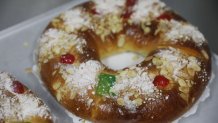On Monday, millions across the globe are celebrating Three Kings Day, also known as "Día de los Reyes," the Epiphany, Old Christmas and Little Christmas...but what exactly does the holiday consist of?
The holiday, which is celebrated on Jan. 6, commemorates the Three Wise Men who, according to the Bible, brought gifts of gold, frankincense, and myrrh to baby Jesus.
According to the Bible, although the birth of Jesus is celebrated on Christmas Day (Dec. 25), the Three Wise Men did not get to see him until twelve days later, which is why Three Kings Day is celebrated 12 days after Christmas.
In many parts of the world, including throughout Central and South America as well as in Spain, the day is the pinnacle of the Christmas season for Roman Catholics. Through the years, the holiday has become more pronounced in the United States thanks to immigrants who have brought over the tradition with them. (Orthodox Christian religions celebrate the Epiphany on Jan. 19.)
Get Tri-state area news delivered to your inbox.> Sign up for NBC New York's News Headlines newsletter.
The Epiphany, or Three Kings Day, is celebrated differently in different countries, however, there are certain traditions and customs that seem universal.
One popular tradition is the "Rosca de Reyes" (also known as "Roscón de Reyes") which is a type of fruit cake adorned with candied fruits symbolizing the jewels on a crown. A doll of baby Jesus is hidden inside the rosca.

Tradition has it that whoever finds the doll will receive good luck...and must also organize a party on Candlemas (Feb. 2)!
News
In the countries that celebrate "Los Reyes", the holiday is one in which large family dinners and gift-giving take place. In these countries, it is not Santa but rather the Three Kings who bring gifts to children -- because of this, similar to the tradition of leaving cookies and milk for Santa and carrots for the reindeer, children gather grass or hay and leave water for the kings' camels. Children also leave their shoes outside their homes on the night of Jan. 5 (or by the home's Nativity scene) to let the magi know that children live there and to leave them candy and gifts.
Three Kings Day parades take place around the world from New York City to Madrid and Uruguay.



